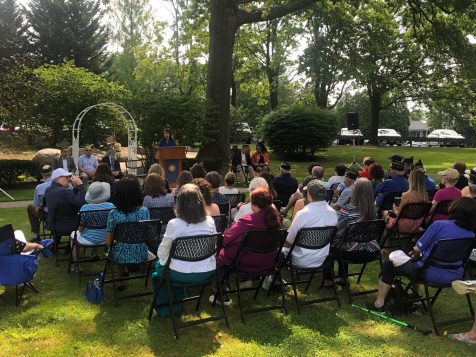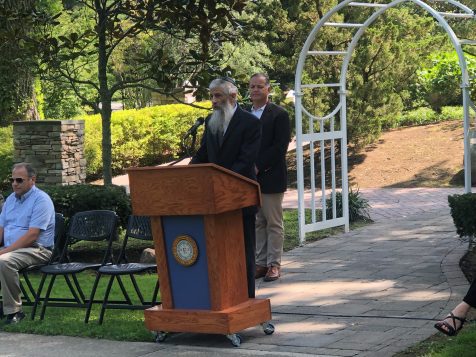Denying Suffolk voters input is undemocratic
Newsday, yet again, reports that our water quality in Suffolk is hitting an all-time low.
When many of us moved to Suffolk after the establishment of the Suffolk County Legislature in 1970 — to be more representative after 200 years of the Board of Supervisors — the Legislature took a lead in protecting our land and water.
We were proud of its ability to “work across the aisle” for the good of our county community. We were proud to have a government that put the well-being of people and our treasured island ahead of any hint of partisan politics.
The case has been made over and over again that septic discharge is the culprit. Now there is a major proposed funding mechanism to make it all work — a sales tax increase of 0.125% to generate an estimated $3.1 billion through 2060 to expand sewers and offer grants to homeowners for new septic systems. It’s the culmination of a 10-year campaign and part of a referendum authorized by the state Legislature in April to be placed on the ballot as early as November. This mechanism is IR1573.
The county Legislature’s decision to table IR1573 and remove it from Suffolk voter input is undemocratic and suggests their underlying distrust of voters to educate themselves when the referendum would be voted on in November. Objections to details of IR1573 should not be the issue now.
Arguments that we have enough money to make a difference in water quality are beside the point. Work is already in progress — for 10 years — and there can always be more money allocated if we have fiscal windfall. We need to do much more, and only allowing voters to take personal responsibility and decide on the $0.125 increase to the sales tax is the first step.
The science is clear, our economy is paying the price, our children’s health is at stake.
Last week, both the Republican and Democratic candidates for Suffolk County executive supported putting the referendum on the ballot. If they can agree, why can’t the Legislature?
The League of Women Voters’ mission is making democracy work through informed and active participation in government. Let the voters decide, not individual politicians in an election year.
Lisa Scott, President
League of Women Voters of Suffolk County
Republican majority is failing its homework
Ironically, in the very same week we learned that the water quality in Suffolk’s waterways is at an all-time low, the Republican-led county Legislature effectively turned down billions of dollars in time-sensitive state and federal grants that would have paid for the needed interventions to clean our waters.
They blocked residents the opportunity to vote on a .125% tax increase, essentially 12 cents per $100 that would have funded the expansion of sewer projects and updated septic systems leaking nitrogen into our waters, the culprit of our poor water quality. The tax funds collected were to be matched by New York State and would have allowed us to access the grant funds. These monies will not be waiting for Suffolk County in a lockbox until this can be revisited next year. The waters which deteriorate in quality with every passing day have also now become much more expensive for us to clean thanks to the actions of the legislature.
In a recent letter [“Voters deserve legislators who do their homework,” July 20], Legislator Stephanie Bontempi [R-Centerport] asserted that the legislators are keeping the water quality referendum off the ballot this November because they want to “do their homework” before bringing the initiative to the people. Anyone with knowledge of the water quality project knows that this plan, which has wide bipartisan support, has been years in the making with ample opportunity to raise concerns, propose changes and “do their homework” rather than waiting until the 11th hour. It was in fact the legislators’ responsibility to do their homework long before they claimed they needed time for further exploration. Interestingly, the Presiding Officer [Kevin McCaffrey (R-Lindenhurst)] had given every indication that the Republican caucus would be supporting including the referendum on the ballot on Election Day.
Reversing course now with contrived concerns shows utter disregard for the bipartisan group of policymakers, scientists and legislators who have been dedicated to this work along with every credible environmentalist group who implored the legislature to move forward with the referendum.
Either they did not do their due diligence when they should have or are concerned that having water quality on the ballot will risk bringing out voters who might not be voting for them. In any case, their decision has effectively lost the county a window of opportunity to affordably address one of the greatest environmental challenges faced by Suffolk County. They have failed “their homework” and have failed the people of Suffolk County.
Eve Meltzer-Krief
Centerport
Democratic candidate, Suffolk County Legislature LD18
Intervention on water quality is long overdue
Contrary to what County Legislator Stephanie Bontempi [R-Centerport] claims, the environmental record of the Republican majority does not “speak for itself.” [Letter, “Voters deserve legislators who do their homework,” TBR News Media editions, July 20.]
What does speak volumes is unanimously blocking voters from deciding for themselves in a general election whether the Suffolk County Water Quality Restoration Act, 10 years in the making, should be implemented. All Suffolk state legislators from both parties support it. Ditto Suffolk congressmen. And ditto both candidates for Suffolk County executive.
Legislator Bontempi refers to “a false sense of urgency.” Last summer and this summer, there have been record fish kills, algal blooms and other water quality impairments. According to the Gobler Laboratory at Stony Brook University, “Excessive nitrogen coming from household sewage that seeps into groundwater and ultimately into bays, harbors and estuaries or, in some cases, is directly discharged into surface waters, is a root cause of these maladies.”
So, should we continue to allow this problem to fester as it has for decades. Or should we finally do something about it? What will it take to give Bontempi a true sense of urgency?
She promises that it’s the “intention” of the Republican majority to “ultimately” allow voters a referendum. Why should we believe this? Excuses for inaction are a dime a dozen. As they say, get it in writing.
In another letter about the same issue, Peter Akras complains about cost [“Proposed sales tax a blank check for developers”]. Implementing this plan would unlock state and federal matching funds. That’s free money for the benefit of Suffolk. He claims our water quality is as good as that of Nassau County. In fact, Suffolk County has more lakes with blue-green algal blooms than any of the 64 counties in New York state. Most water quality impairments in Long Island — brown tides, algal blooms, fish kills, hypoxias — are in Suffolk.
He also asserts that if homeowners want to install advanced septic systems, the cost should be on them, not “on the public dime.” This is fundamentally wrongheaded. The benefit of installing these systems doesn’t go to the individual homeowner no more than does the benefit of lugging disposed toxic chemicals to a recycling center instead of simply dumping them in the garbage. The benefit goes to the public — to all of us — in the form of cleaning up the environment in which all of us live and finally doing something about the toxic algal blooms and hundreds of thousands of dead fish in our bays and estuaries.
David Friedman
St. James
Let voters decide
Thomas Paine said something like, “A body holding themselves accountable to nobody ought not to be trusted by anybody.” The majority in the Suffolk County Legislature is blatantly exercising the evils of “legislature-ism,” stealing the residents’ ability to register their vote on their own drinking water and claiming to know more than the voters.
The Republican majority in the Suffolk Legislature cannot be trusted. What choices will they deny next?
Joan Nickeson
Terryville
Legislature appropriately nixes sewer tax
Kudos for the Suffolk County Legislature for not enacting another tax — that always increases over time — for sewering the county by closing cesspools and septic tanks in homes and small buildings, while building and expanding sewer plants and laying the large and numerous pipes needed for connections. This is no small change as $2.1 billion is mentioned arising from this initial tax.
Sewering is the landowners’ and developers’ dream. Lack of sewers prevents them from increasing building height, numbers and density, hence more rent, profits and value. If they could get the Legislature to have the public pay for sewering, they hit the lottery.
Regional sewer plants are concerning. Huntington has one as does Northport, for example. They discharge into the harbor and even with “upgrades,” high nitrogen and other components flow into the harbor and beaches. In stagnant conditions, the water is deoxygenated, fish die and green and brown tides of algae proliferate. Would you swim from a town beach in a harbor with a discharging sewer plant?
But are cesspools contaminating groundwater? They have been used since Roman times and work for single homes and structures. Waste goes into a perforated cement cylinder buried in soil and bacteria digest it. The effluent flows through the dozens of feet of sand and soil and is cleansed before entering the water table.
Sewering may be useful in coastal and near-coastal areas to prevent pollution. The rest of Long Island is doing fine with cesspools and septic tanks, and is quite happy that high-rise offices, housing, commercial structures and density are not blighting their communities.
Mark Sertoff
East Northport
Maryhaven is not just a facade
The July 13 article, “Port Jeff village board cans code changes for Maryhaven,” states that the proposed changes “were an effort by the previous administration to preserve the historic building.” That’s not entirely the case.
While the preservation of the building’s facade was touted as a concern, the proposed code change was, as former village attorney Brian Egan explained, a “proactive” step to clear the path for developers. And because that change in code, from Professional Office to Moderate-Density Residence, would have allowed developers to construct nearly 200 condos — a significant increase in density — it came under strong opposition from the public.
Many residents urged the board of trustees to consider alternative uses for the property that would not only be in the best interests of the village as a whole, like moving our Fire Department and EMS there, but more in line with the legacy of a building once known as the Center of Hope.
We thank Mayor Lauren Sheprow and the current board of trustees for rejecting this code change and allowing us the opportunity to explore those other options. A building, which for generations was used to help those in need, should be repurposed for something greater than expensive condominiums that would only serve the few at the expense of the many.
Ana Hozyainova, President
Kathleen McLane, Outreach Officer
Port Jefferson Civic Association
Official newspaper of the Northport-East Northport school district
It is with great pleasure that I notify you that at the Annual Organization Meeting of the Board of Education of the Northport-East Northport Union Free School District, held on Thursday evening, July 13, The Times of Huntington-Northport was designated as the official newspaper for the district publications and legal notices for the 2023-24 school year.
We thank you for your support and extend our best wishes for the new school year.
Beth M. Nystrom
District Clerk
Official newspaper of the Village of Belle Terre
At the Organizational Meeting of the Board of Trustees held on July 18, The Port Times Record was designated as the official newspaper for the Village of Belle Terre for the fiscal year ending June 30, 2024.
Louise Smit
Deputy Village Clerk-Treasurer


































































